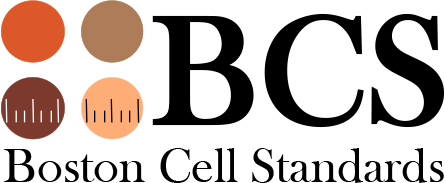
Custom Solutions
Boston Cell Standards recognizes that the QA needs of pharma, biotech, and academic laboratories, may be several steps ahead of the present clinical market. As the only provider of QA products for in situ assays that incorporate measurement traceability, we are happy to create calibrators and controls for future patient-care or research needs. Some of the uses of our products by our pharma partners are as follows:
The ability to define and measure
concentrations outside of the current
clinical norm: e.g., “nonzero” HER2.
Patient stratification
Instrument standardization prior
to the start of a clinical trial
A consistent and readily
available source of controls
Tissue stratification
Multiplexing of controls,
especially for IF

Cost
Each project is priced differently, as defined in a Statement of Work.
Custom services are priced based on the cost of the following three steps.
Analyte Identification
Measurement traceability for in situ assays requires that we use purified analytes. Step one is deciding on the form of the analyte. For immunohistochemistry and immunofluorescence, peptides that incorporate a linear epitope are a robust raw material for incorporation into the finished product. Often, primary antibodies were raised to a peptide-carrier conjugate, so the peptide is already known. If not, we have mapped many epitopes. Antibodies that work well for formalin-fixed, paraffin-embedded samples usually are directed to linear epitopes1. We have also developed successful QA products using purified or recombinant proteins. The decision is one we discuss with the customer. Additional expenses may involve epitope mapping, peptide synthesis, or the cost of a protein.
Manufacture
Boston Cell Standards already has a finely tuned manufacturing process for incorporating a peptide or protein into a finished product. We routinely covalently couple analytes to our silica glass microbeads, add in optical standard microbeads, and re-suspend these microbeads in a proprietary liquid matrix at a specified microbead concentration. The products are then robotically printed on a proprietary protected isocyanate-coated slide (for calibrators)2,3 or aliquoted into vials (for on-slide controls).
Quality Control
Boston Cell Standards follows cGMP protocols for all manufactured products, which includes both in-process controls as well as final product QC. For calibrators, we generate a Certificate of Analysis describing each calibrator level’s analyte concentration, traceable to NIST SRM 1934.
For customers requesting custom calibrators who use immunofluorescence testing, please be aware that our analyte concentration measurements use fluorescein, for measurement traceability to NIST SRM 1934. It has no effect on immunohistochemical testing. For immunofluorescent assays, fluorescein can be used as an internal control, correlating with analyte concentration. This also requires that the assay itself uses a spectrally non-overlapping fluorochrome.
We look forward to discussing how we can help with your unique project.









